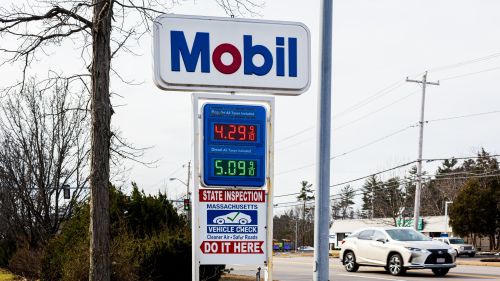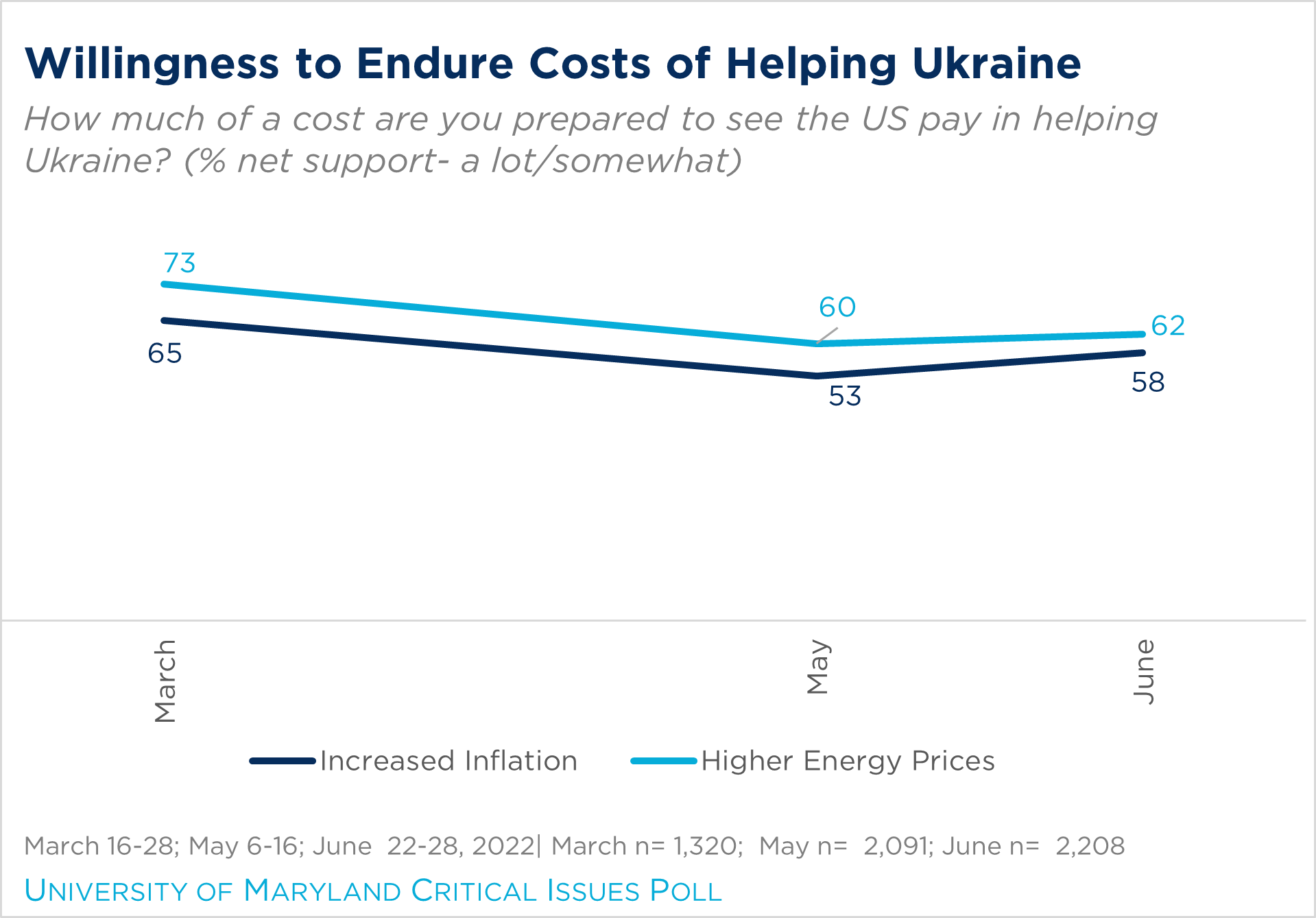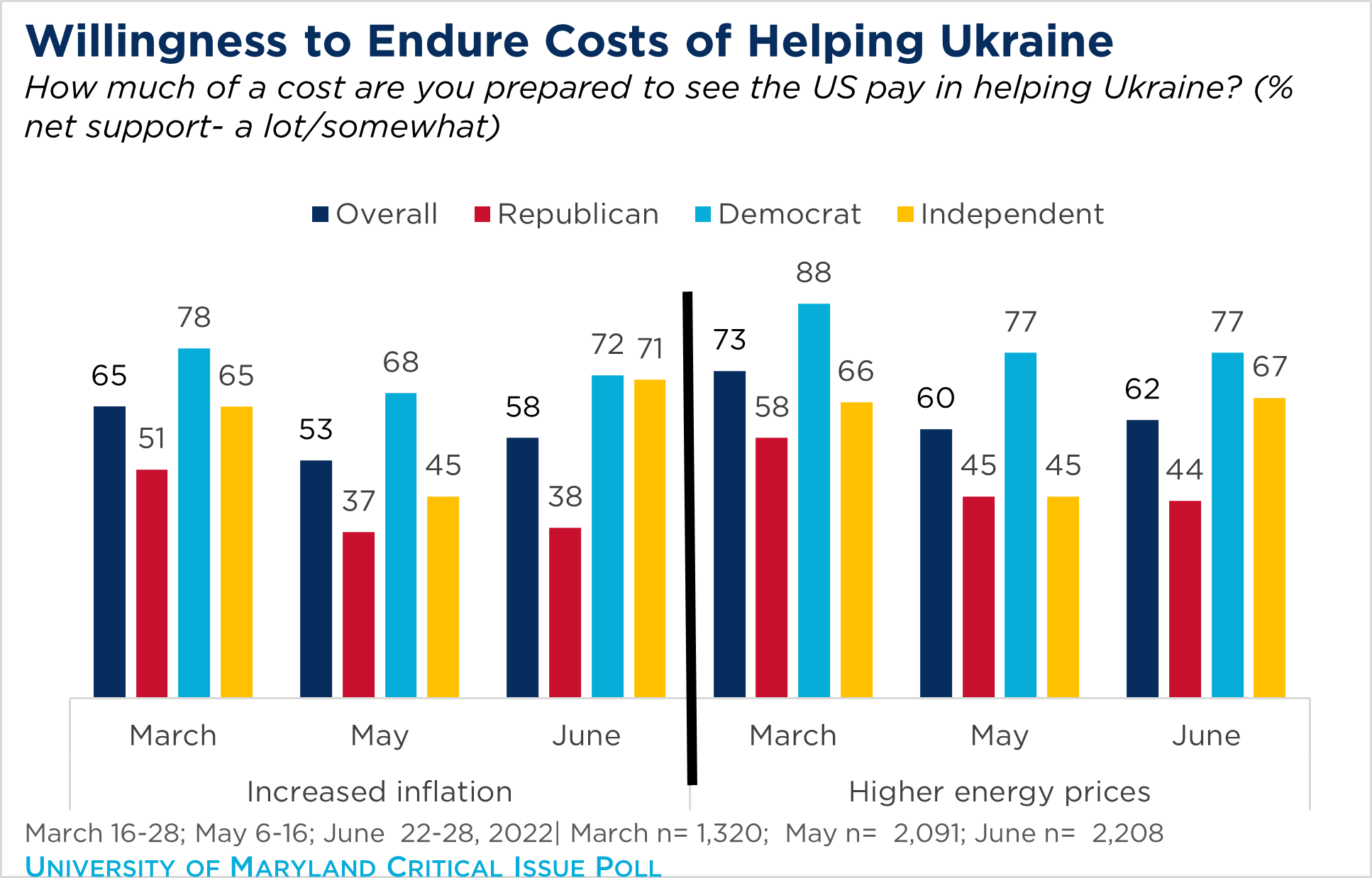The Impact of US Economic Woes on Support for Ukraine

Is the looming economic crisis influencing the public’s preferred response to the war in Ukraine? Recent polling suggests it's possible.
The war in Ukraine has been going on for four months and is beginning to fade from the mainstream American news cycle. At the same time, Americans face rising inflation, with food and gas prices leading the way. These economic pain points are not only widely covered in the media, they’re also readily apparent to Americans in their day-to-day lives. While these economic trends are driven by a complex mix of factors, experts say the war in Ukraine has exacerbated them and will likely continue to do so as the conflict drags on.
Polls conducted early in the war found that Americans were largely willing to bear some economic costs to support Ukraine. A strong majority of Americans both supported Ukraine and were willing to incur higher gas prices in the name of democracy. Public support is still with Ukraine: a May 8–10 poll from The Economist and YouGov revealed that 70 percent of Americans sympathized with Ukraine more than with Russia in the context of the current conflict. But as rising costs at home pinch Americans’ wallets, are they still willing to incur the financial costs? Polls suggest that while Americans are more hesitant to bear those costs than they were at the start of the war, a majority continue to say they are willing to endure higher energy prices and higher inflation in order to support Ukraine and punish Russia for its invasion.
Americans’ Willingness to Bear Costs May Be Slipping, but not Completely
Rising prices at the store and at the gas pump are central to Americans’ frustration with the economy: according to an April 25–May 1 survey from Pew Research Center, 70 percent of Americans see inflation as a very big problem today. And while some experts have claimed that prices in the United States would be rising right now regardless of the invasion of Ukraine, the public certainly sees a link between the two. An April 7–10 CNBC poll finds that 55 percent of the American public believes that Vladimir Putin’s invasion of Ukraine is a major cause of inflation and increasing costs.
This perceived causal link—placing blame for the US economic woes on the situation in Ukraine—is reflected in the declining support for maximum sanctions against Russia at the expense of the US economy. In a March 17 –22 AP-NORC poll, 55 percent of Americans thought that imposing effective sanctions on Russia should be a priority, regardless of the impact it would have on the US economy. In a follow-up poll conducted April 14–18, the portion of the public favoring sanctions even if they would damage the economy decreased to 50 percent, and in a May 12–16 poll, this figure fell even further to 45 percent. Instead of prioritizing sanctions on Russia, a bare majority (51%) of Americans now favor limiting damage to the US economy, even if it means sanctions on Russia are less effective.
A series of recent polls from the University of Maryland (UMD) initially indicated that the American public’s willingness to make economic sacrifices to support Ukraine was trending downward. Between the March 16–28 and May 6–16 UMD polls, preparedness to endure higher energy prices and an increase in inflation decreased. While public preparedness dropped in May, the June UMD poll reflected a rebound in support as willingness to incur higher energy prices and increased inflation both rose. As consumer prices seemed to increase in the month of June, this resurgence in support could be linked to the news that Russia is preparing to resume the attack on Ukraine.

Partisan Divisions Emerge
One additional factor in the public’s evolving attitudes on Ukraine: partisanship. The UMD Critical Issues Poll finds that Democrats are significantly more willing than Republicans to endure higher inflation and energy costs in support of Ukraine. Although willingness to pay those costs decreased across party lines from March to May, June results revealed a widening partisan divide between Democrats and Republicans. In addition, the June poll also registered a large increase in support among independents, coming closer to Democratic support.

With public support for Ukraine becoming less unconditional, and partisan divisions deepening, it may become politically difficult for the Biden administration to maintain a maximum-pressure sanctions campaign against Russia. If American households continue to feel the pinch of increased inflation and hear warnings of an impending recession, it is possible that attitudes toward bearing economic hardship on Ukraine’s behalf will drop more sharply in the coming months. On the other hand, if inflation eases and energy prices fall, Americans may be more willing to bear some costs on behalf of Ukraine.

